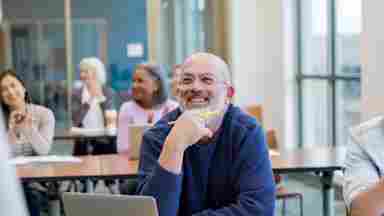How does lifelong learning power your brain?
Exposure to new learning helps keep your brain healthy. Neuroplasticity enables continued learning and challenges to foster positive brain changes and the formation of new neural pathways.SCIENCE SAYS:
Cognitive reserves influence the brain's resilience to damage or disease. Increased cognitive reserves can help prevent or delay symptoms of dementia and brain injury. Lifelong learning helps build up cognitive reserves and increase the chances of staving off cognitive decline.WAYS TO BEGIN:
- Cultivate your curiosity by exploring new hobbies (or forgotten passions.)
- Identify gaps in your knowledge and experience and find ways to fill them.
- Evaluate the credibility of information, like the purpose and accuracy of a news story.
- Ask objective and analytical questions, and then seek out high-quality sources of information that address varied points of view.


